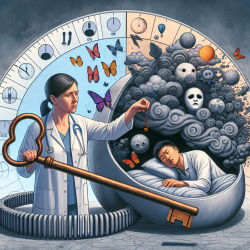Enhancing Practitioner Skills: Insights from Medical Students' Mental Health and Sleep Patterns
As practitioners in the field of education and therapy, understanding the dynamics of mental health and sleep patterns can significantly enhance our ability to support students effectively. The recent study titled Mental Health and Sleep Habits During Preclinical Years of Medical School provides valuable insights into the cyclical changes in anxiety, depression, and sleep quality among medical students. By implementing these findings, practitioners can better support students in managing their mental health and sleep habits.
Key Findings of the Study
The study observed 197 medical students over two years, assessing changes in anxiety, depression, and sleep quality. Here are some key takeaways:
- Cyclical Changes: Depression, anxiety, and sleep habits displayed cyclical changes associated with the academic and seasonal cycle.
- Impact of Chronic Disease: Students with chronic diseases and fewer hours of sleep experienced increased severity in mental health issues.
- Exercise and COVID-19: Interestingly, exercise did not significantly impact mental health, and the COVID-19 pandemic was not found to have a significant effect on mental health.
Implementing the Findings
Practitioners can use these findings to improve their approach to supporting students. Here are some strategies:
- Monitor Cyclical Patterns: Be aware of the academic and seasonal cycles that may affect students' mental health and sleep. Implement regular check-ins during peak stress periods.
- Support Students with Chronic Conditions: Provide additional resources and support for students with chronic diseases, as they are at higher risk for mental health issues.
- Promote Sleep Hygiene: Encourage students to prioritize sleep and educate them on good sleep hygiene practices to improve their mental health and academic performance.
Encouraging Further Research
While this study provides valuable insights, further research is essential to explore the nuances of mental health and sleep patterns in different educational contexts. Practitioners are encouraged to contribute to research efforts by collecting data, sharing observations, and collaborating with researchers to expand our understanding of these critical issues.
Conclusion
The study underscores the importance of understanding the cyclical nature of mental health and sleep patterns among students. By implementing these findings, practitioners can enhance their support for students, ultimately leading to better mental health outcomes and academic success. To read the original research paper, please follow this link: Mental health and sleep habits during preclinical years of medical school.










